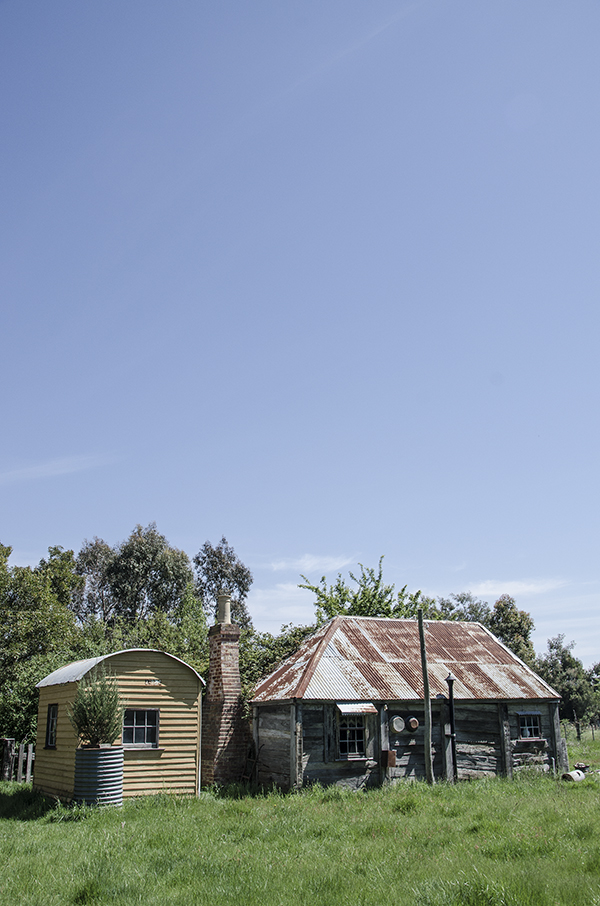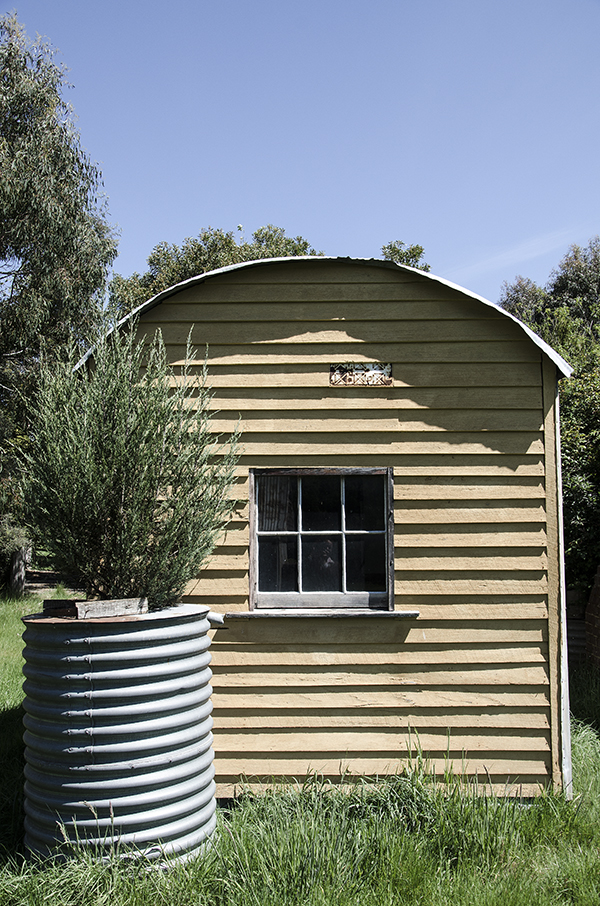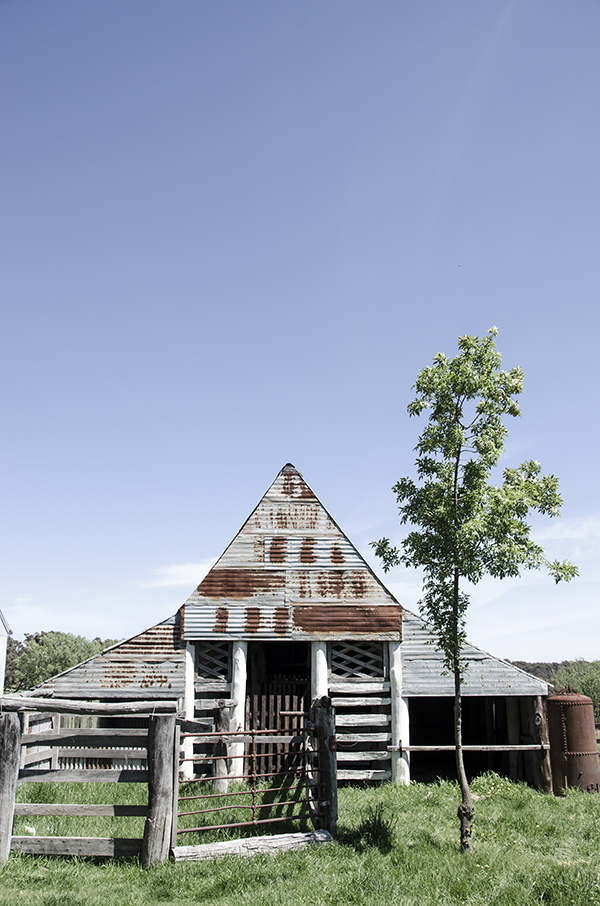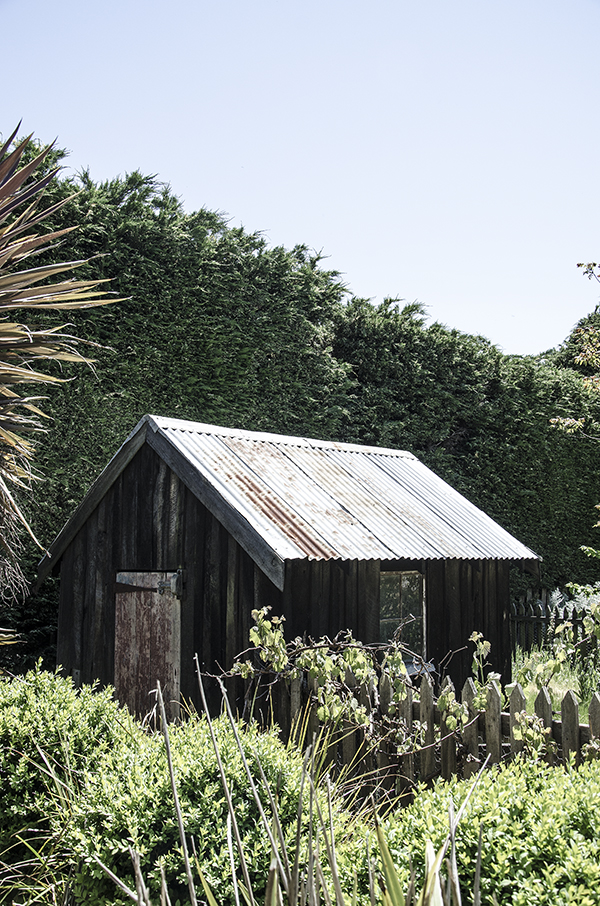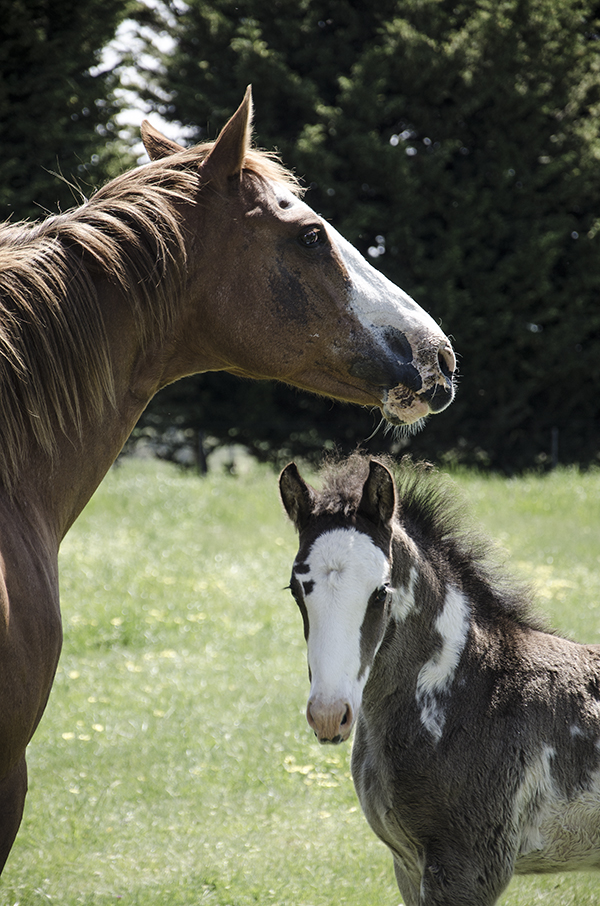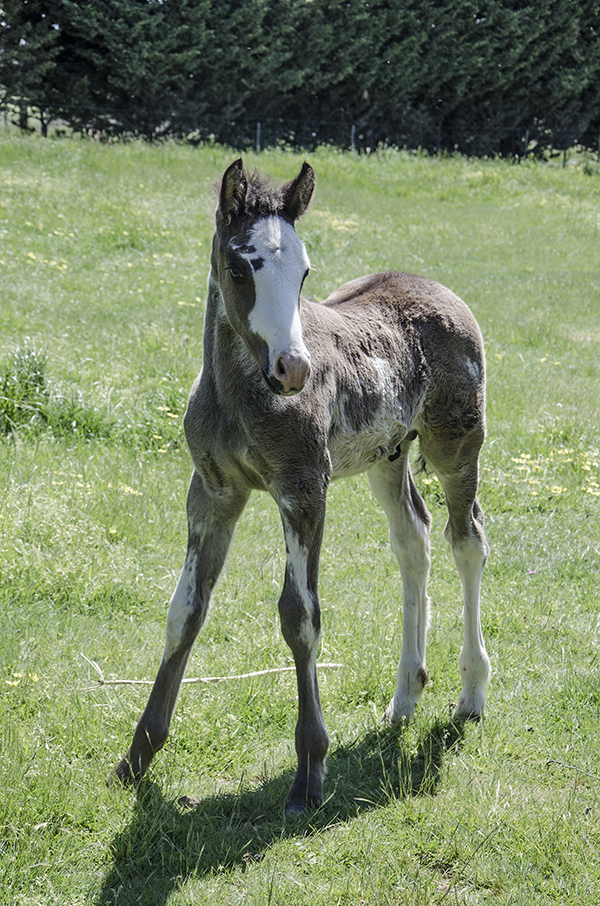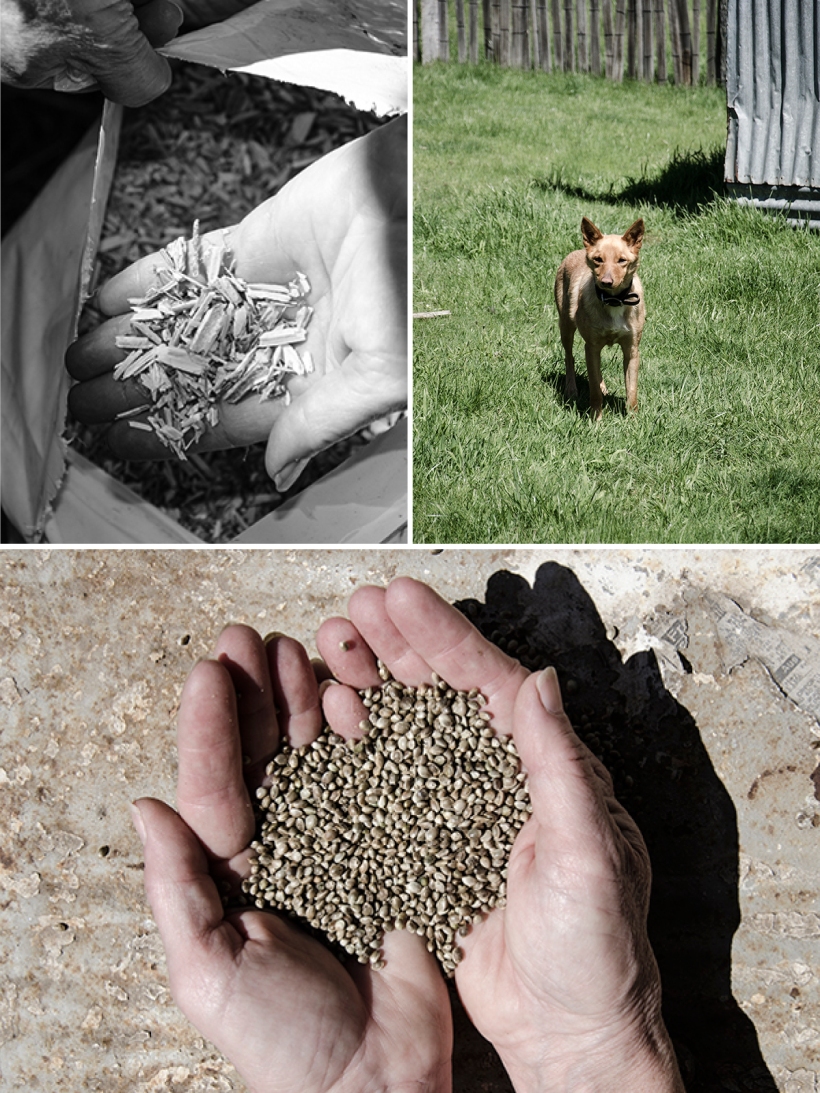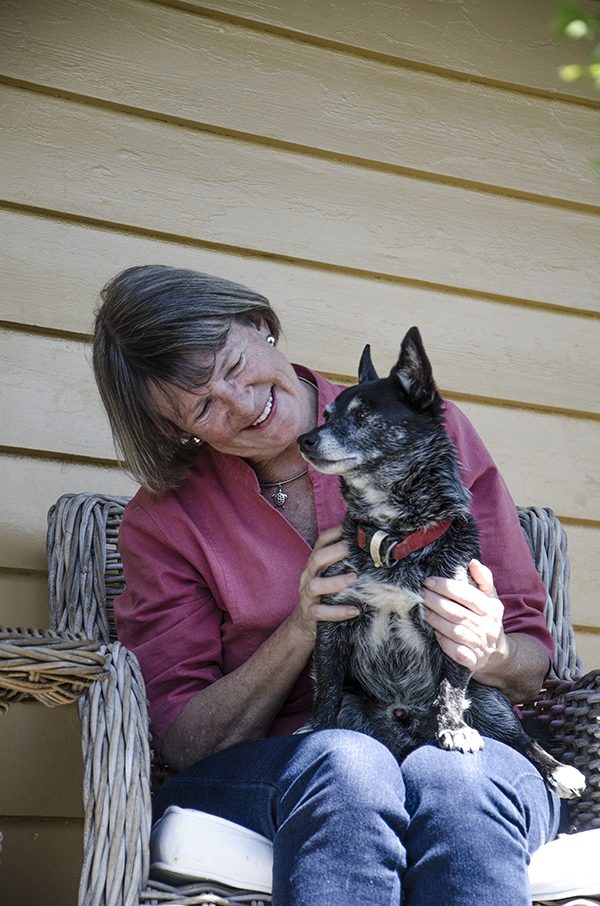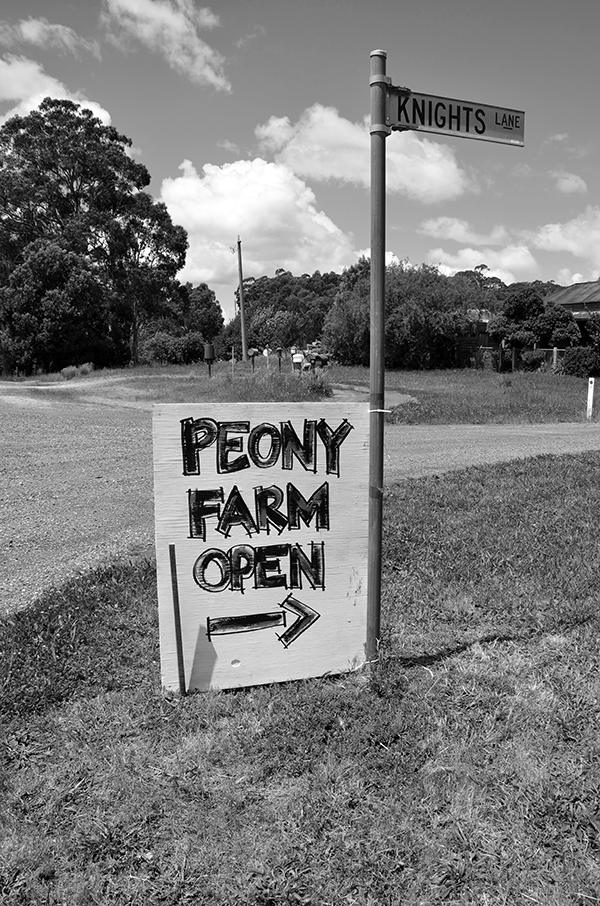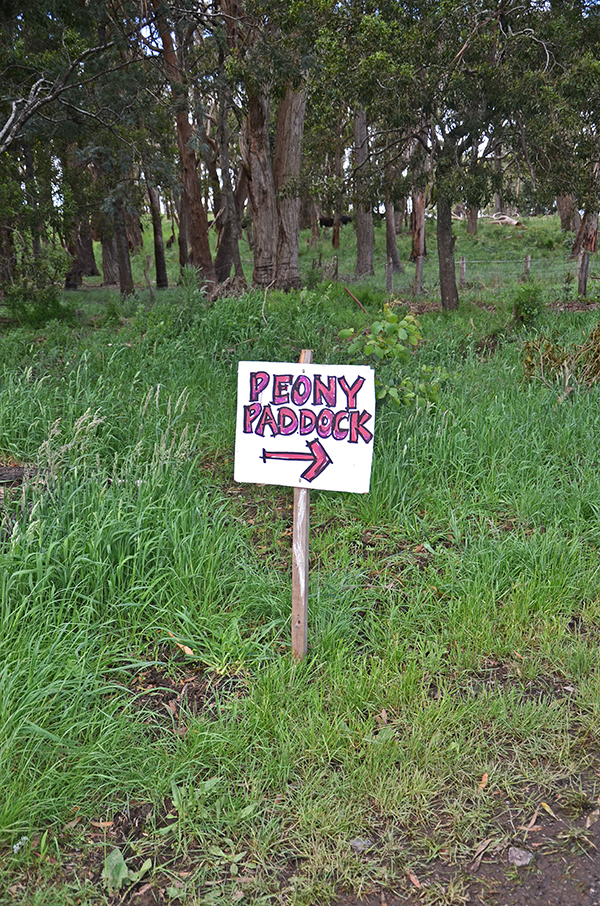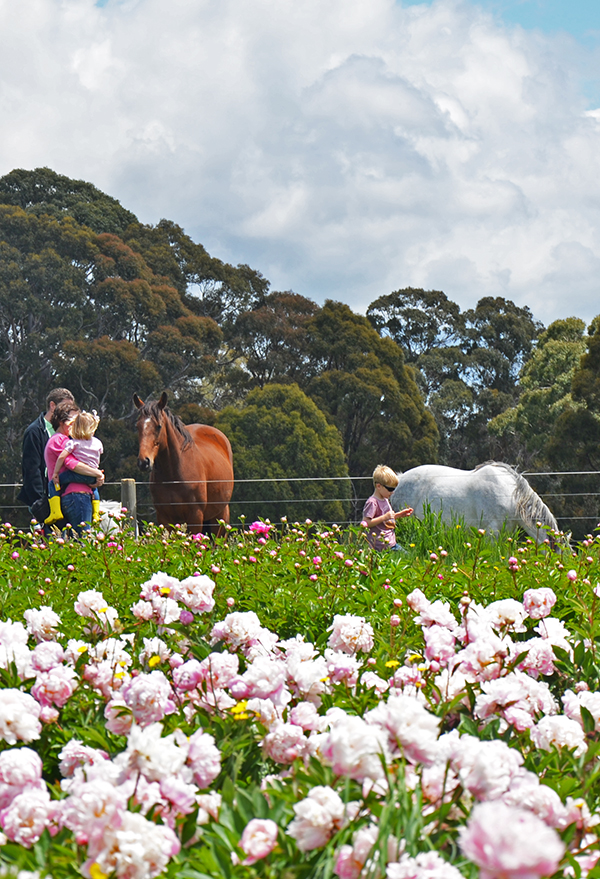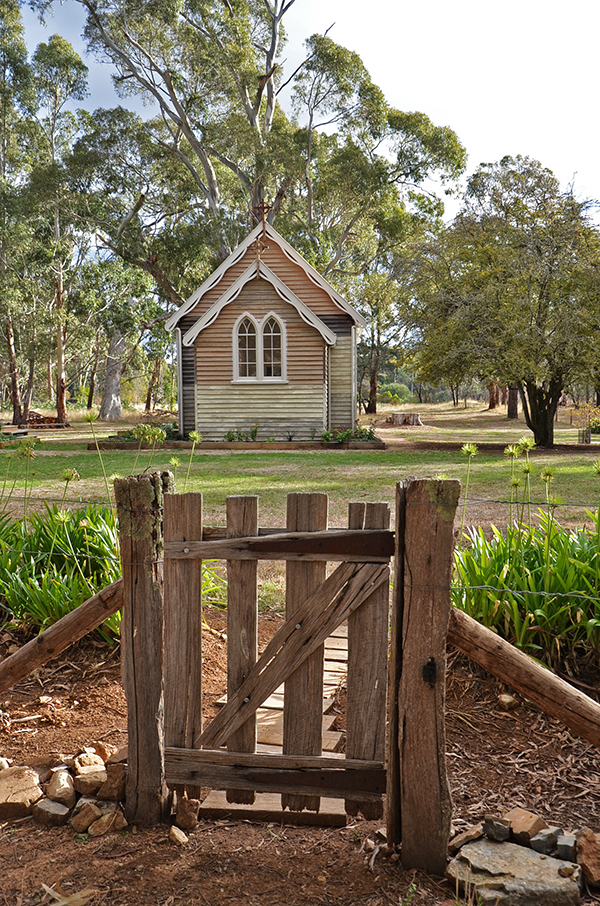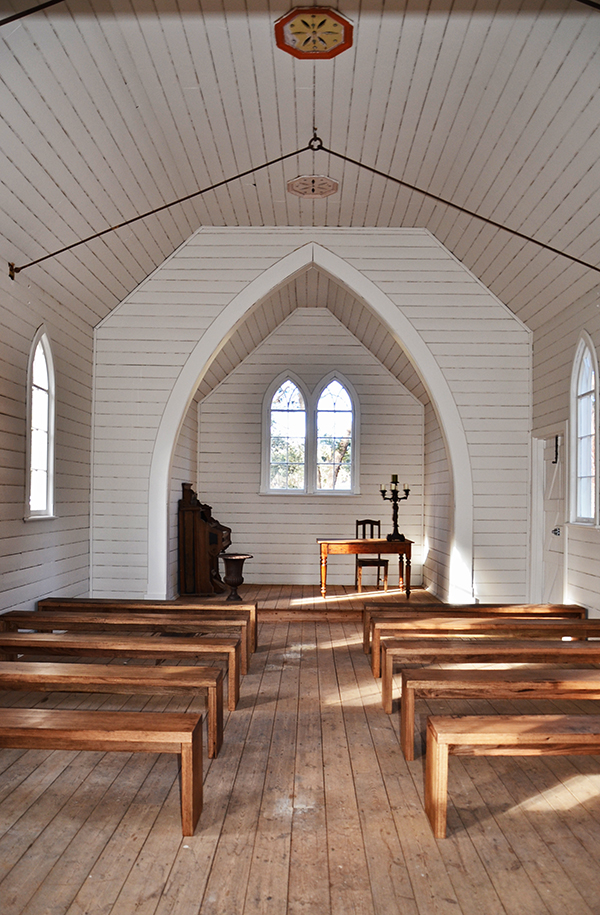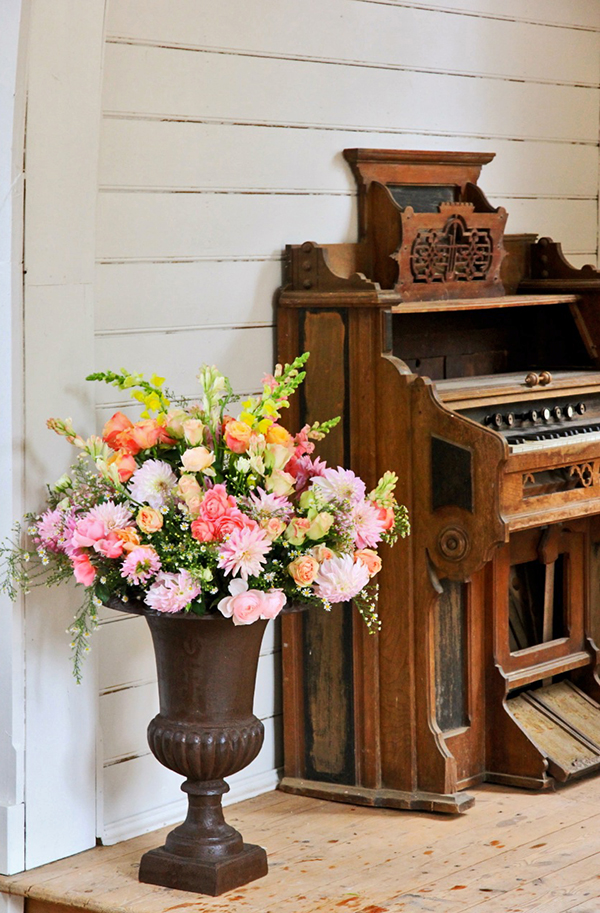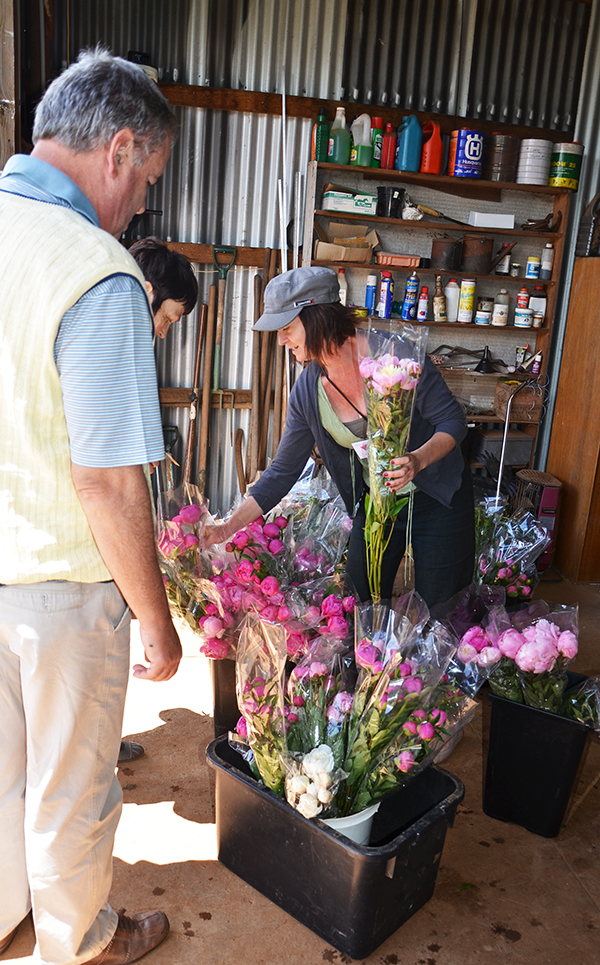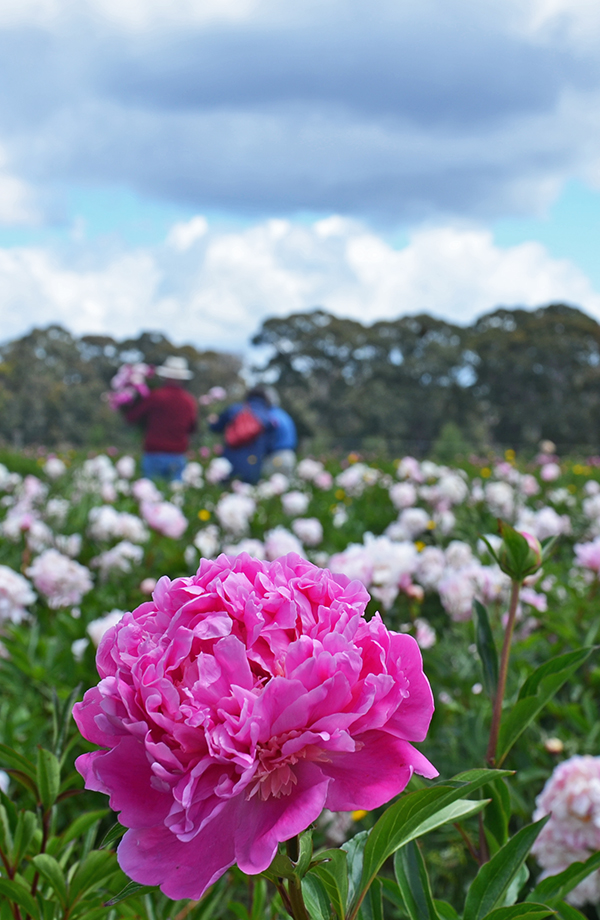
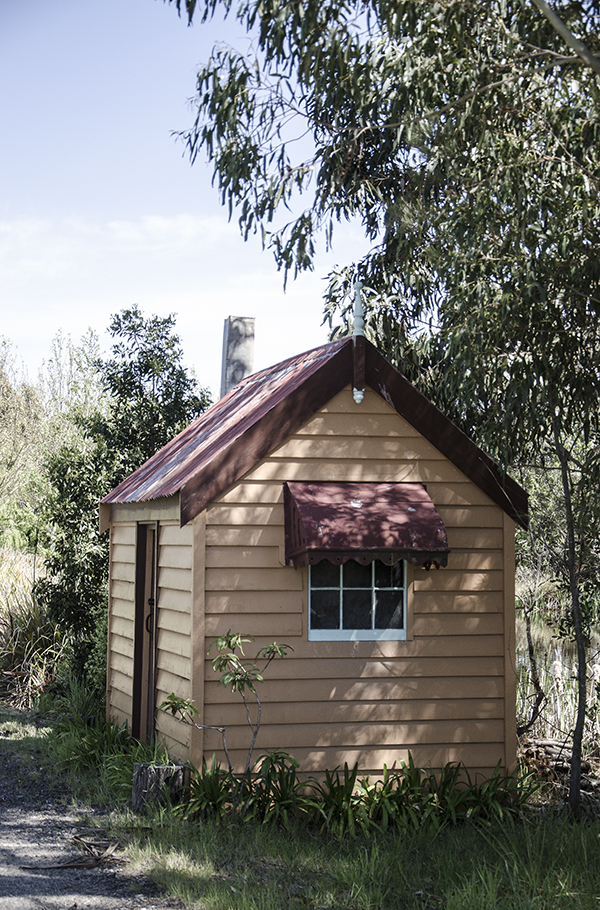




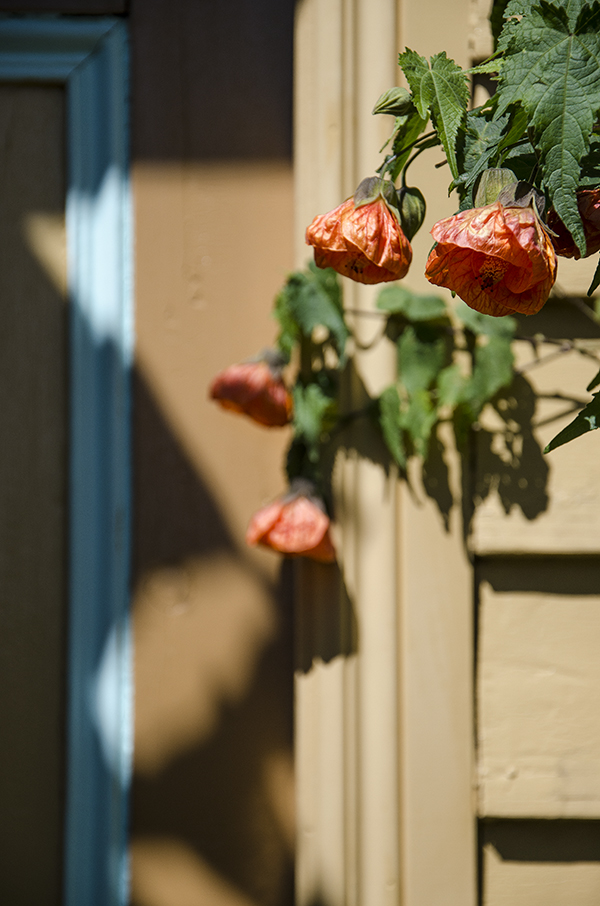
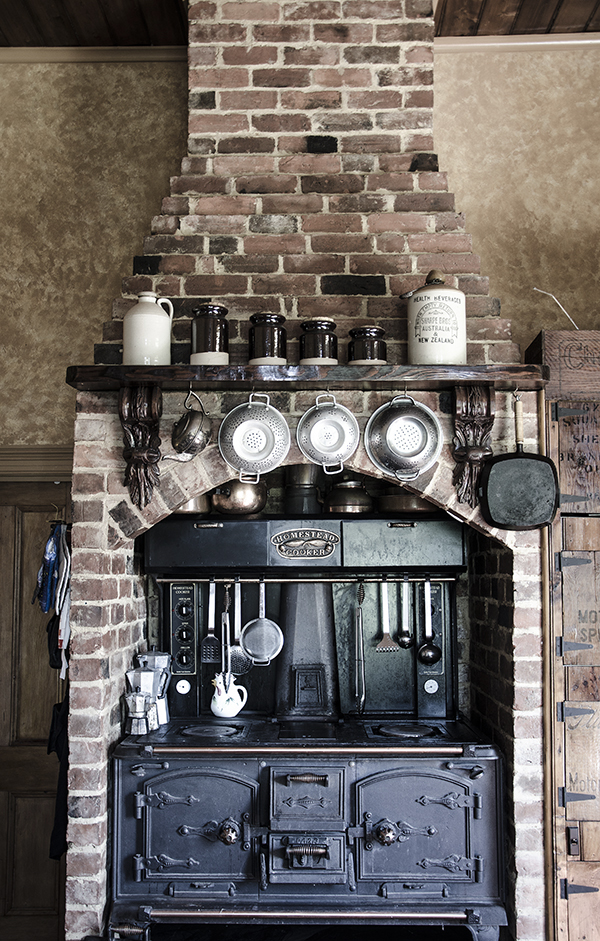
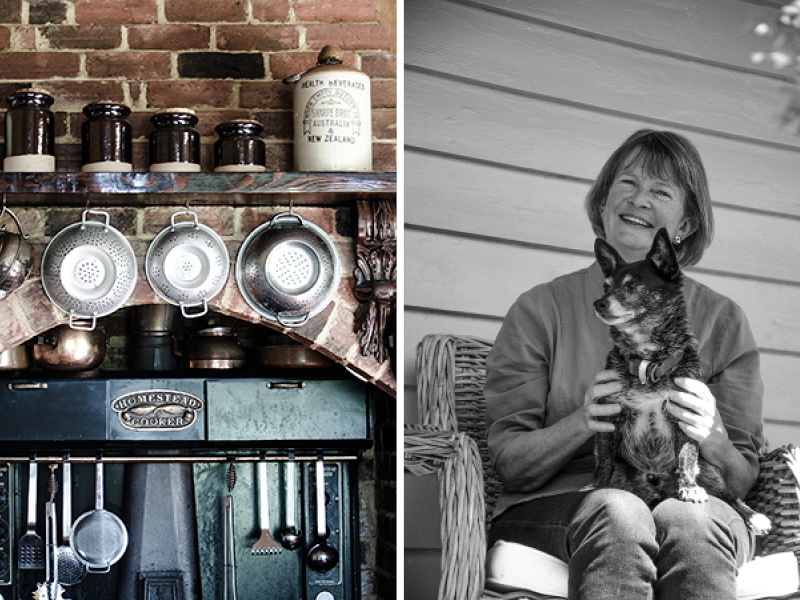 When I arrived at the entrance to Bunjil Farm I found myself greeted by the sweetest little Coach house EVER which means today’s story really was a serious case of ‘You had me at hello!”
When I arrived at the entrance to Bunjil Farm I found myself greeted by the sweetest little Coach house EVER which means today’s story really was a serious case of ‘You had me at hello!”
The long, leisurely drive into Bunjil Farm is beguiling. A meandering track winds guests past ponds, paddocks, ponies and peek holes through pine hedges. Glimpses of historic structures, salvaged and saved, tantalise the imagination of days gone by; a timber butchery with the loveliest pitched-roof, a blacksmiths’ shop, old stables and miner’s huts, not to mention a grand old weatherboard home replete with sunny verandah, rambling garden and towering folly! Oh, then to step inside! Ahead, a dark timber staircase beckons while to the right the northern sun beaming into the kitchen lands upon an enormous black wood-fueled Homestead Cooker. Upon my visit, it was busily baking Anzac biscuits …
OK! I’d better stop there {before I forget my manners} and introduce you to the amazing, passionate, hardworking, delightful owner Lyn Stephenson.
Lyn purchased Bunjil Farm a little more than 18 months ago after working in the high-pressure corporate world. Since then, and with little farming experience of her own, Lyn has already sown and reaped an industrial Hemp crop {read more about this amazing crop in Lyn’s interview below and via the Association here} AND bought herself a tractor!
“A “tree change” is what has allowed the freedom to enjoy home-grown produce and appreciate the bounty that the earth can provide. We are aiming to become more self-sufficient as time progresses, severing the ties of corporate Australia and commercialisation.”
Bunjil Farm is DESTINED for great things. Already a delightful weekend getaway, it BEGS to be enjoyed as a creative space for weddings, photographers and stylists and, who knows, perhaps even to play host to a future Lost Trades Fair and creative weekend workshops. A visit to Bunjil Farm is a lesson in discovery + possibility. To be able to share a snippet of Lyn’s journey is an inspiring privilege + honour. We admire her courage to be creative and to open her world and dreams to other like-minded folk with whom she can collaborate. Watch this space!
Enjoy! {d} x
Prior to buying your farm about 18 months ago, you worked in the high-pressure corporate world. Tell us a little bit about your background and how you came to leave it all behind to buy a farm in Springhill?
My father grew up on a wheat and sheep farm between Moree and Inverell, in northern NSW. My mother grew up on a dairy farm near Bega, in southern NSW. As young adults, they both moved to Sydney where they met, married and had me. Soon after, they moved to Canberra which is where I grew up. In those days, Canberra was like a big country town. My mother always grew vegies in the back yard and took a particular interest in herbs. Dad was an engineering type and, lacking a boy to pass on his knowledge, he tried teaching me some of his skills. Whilst I wasn’t a great student, I think I got the bug to live in the country from a very early age, perhaps by some kind of parental osmosis. I became disillusioned with major corporations – seeing the waste of money and experiencing the brunt of some of the self-possessed ladder-climbers who held no regard for their real bosses (the shareholders). Eventually, I just sold up and moved out.
You have named your property “Bunjil Farm”. Tell us the story behind its naming.
I wanted to come up with a name for the farm that represents my aspirations for the place. I started with using hemp in the name and coming up with puns, e.g. “hemporium”, “hemptastic” or even just “the hemp farm” but none of the names I came up with grabbed me. When I was harvesting the seed from my first hemp crop earlier this year, an eagle was circling above. I thought “Eagle Farm” might be a good name – but that’s a race track! Back to Google. I started looking up aboriginal words and found Bunjil. When I found the story of Bunjil, I knew I had found a name for my farm. Bunjil was the creator of all things. After he had finished creating, he was blown into the heavens and remains there today as a star. I wanted a simple logo and a stylised version of the aboriginal dot painting symbol for a star has become my logo. I asked representatives of the Kulin Nation for permission to use the name Bunjil. They had no hesitation, saying that my aspirations for the farm (putting back more to the earth than I remove) was exactly what Bunjil taught.
Okay, I confess to having serious farm envy. Your ‘outbuildings’ are the stuff photographers, stylists + location scouts’ dreams are made of! Describe them for us and tell us about your vision for these truly amazing spaces?
There are 19 buildings on the property, in varying sizes. All of them date from the mid- to late 1800s and all have been rescued from elsewhere and reconstructed on the property many years ago. This fits well with my philosophy of re-using and recycling. I have just opened a bed & breakfast in the main homestead as well as in a slab-built settler’s hut dating from the 1850s. Ultimately, I would like to open the remainder of the property for expos, functions, etc. and also to establish a focal point to educate people on the uses and benefits of hemp. I think we have the potential to develop an appealing tourist attraction with an educational focus on hemp.
You do a great deal of voluntary work to promote Industrial Hemp (the non-drug varietal of Cannabis Sativa) and all its many uses as food seed, oil, wax, resin, rope, pulp, paper, fuel, clothing, building, mulch, animal bedding and skincare. It sounds like a ‘super’ crop. Why haven’t we heard more about it and what makes you so passionate about it?
Well, that’s a difficult one to answer as far as why we haven’t heard more about it. In the 1930s, when nylon was invented, big business pursued the development of new technologies: the cotton industry was flourishing and newspapers were being produced using wood pulp. Hemp fell into oblivion. Today, the hemp industry is gradually expanding, particularly in Canada and parts of Europe. In fact, France never stopped producing hemp for food and fibre. Some innovators are beginning to realise the possibilities of hemp and are developing processing techniques to bring hemp out of the pre-industrialised world and into the 21st century. I am interested in the plight of many Australian farmers and I see hemp as being an ideal crop to include in crop rotations. If nothing else, it is an excellent nitrogen fixer and requires no herbicides or pesticides. If we can get our politicians to see their way clear to approving hemp seed as a food, then Australian farmers have an alternative, productive crop.
This year you will plant about 7 acres of Industrial Hemp. Describe the ‘see for yourself’ opportunities + experiences this crop will provide?
I wanted to touch and feel and try and understand the crop myself so I applied for the necessary licence to grow it. Initially, I will be holding information sessions for members of the Industrial Hemp Association. I then hope to build on this by hosting field days for farmers interested in growing hemp, as well as workshops for people to learn about hemp-lime construction. I already receive guests at my B&B who are interested in learning more about hemp.
Speaking of crops; you’ve just bought a tractor, a harvester + a binder! Give us a little insight into how it feels to buy your first set of big farm ‘toys’!
I confess that there are many days where I feel that I might have bitten off more than I can chew. However, I have a steadfast resolve to progress with my plan, even if it means chewing slowly! I felt a little bit like the possum in the spotlight when I was the successful bidder for the machinery at a clearing sale – stunned! What have I done? My friends then told me there’s no turning back now (they mean that I have really now officially become a country dweller). Well – who’d think I could ever go back to the city now anyway? Having bought all these things, the steep learning curve of country life continues. I now have to work out how to operate all them! Fortunately, I have a couple of very tolerant and patient friends at the ready.
What does a typical day in the life of Lyn Stephenson the ‘Bunjil Farm, Rural Retreat Host, Industrial Hemp Advocate + Tractor Owner’ look like; from when you wake to when you go to sleep?
Wow – no two days are the same. They always start out the same, but then things go off in all kinds of directions. The chooks and the ducks are the first task – feeding them and letting them loose after being cooped up in their overnight fox-proof dwellings. There is always plenty of mowing, weeding, pruning and harvesting to do. But the time often gets hijacked by callers on my mobile wanting information about hemp. These calls generally last 30-60 minutes. Or it could be that the bull has jumped into the neighbour’s paddock and I have to go and retrieve it. Lambs are born; foals are born … it’s all so wonderful!
Where or who or what do you draw your inspiration from?
I’m often told that I have guts. So I guess my inspiration largely comes from within. I tend to become indignant at injustices (such as continued prohibition of hemp food in Australia) and can sometimes go like a bull at a gate to try and change things. When things don’t work out the way I want them to, I try to find another way. A crusty NSW politician once said “Just keep goin’. It doesn’t matter which direction, just keep goin’.” We all need some kind of purpose or we die – that’s what I keep reminding myself.
Do you consider yourself to be a ‘Countryphile’? Do you love country life? Why?
Absolutely I’m a Countryphile – I was a Countryphile even before I left the city! I used to buy the Weekly Times and just dream. I should have debunked from the city years ago but I was stuck on the treadmill. To paraphrase Dave Ramsey, author of “The Total Money Makeover”, I was buying things I didn’t need with money I didn’t have to impress people I didn’t like or rarely see. It suddenly struck me one day and I sold up and haven’t looked back. I couldn’t believe it when I moved here – complete strangers will smile at you in the supermarket!
What aspect of country life are you loving MOST at the moment?
Well, I can’t resist another quote – Darryl Kerrigan in “The Castle” – “Ah, the serenity!” The bird-life at Bunjil is extraordinary. I love to sit on the verandah in the evenings just listening to the birds and the frogs. Bliss!
What have been the most CHALLENGING aspects of your tree change so far?
Every day is a challenge. Everything is new. In the beginning, I didn’t even know how to open a jerry can! Now I can unbog my ride-on mower using fence strainers. I’m learning to drive my tractor; learning to watch the weather and the seasons for reasons other than “Do I need a raincoat today?” I guess winter is a challenge. Those early, dark mornings with blistering winds – it’s a real challenge just to emerge from underneath the doona to start the day sometimes.
Tea or coffee?
Coffee in the morning. Tea in the afternoon.
Do you have a favourite country café? Where and why?
I don’t go to cafes much any more but when I do, I like Duck Duck Goose in Kyneton. The owners are lovely people, the coffee is good, the food is fresh and it has a very relaxed, unpretentious atmosphere.
Where was the last great meal you enjoyed/shared in the country?
Du Fermier at Trentham. Annie Smithers is a genius.
Would you ENCOURAGE others to live a country life? Why/why not?
Well I think that what I’ve done is something everyone should do; but if they did, then we’d just be creating more congestion and another big city right here. I would rather just give people a little taste of country life at my B&B and let them go back to their hectic city lives, hopefully relaxed, enriched and more knowledgeable about the possibilities of hemp.
What are the Top 5 Tips you’d give those dreaming of making a TREE CHANGE?
1. Stop dreaming.
2. Just do it.
3. Don’t procrastinate – there is no point wondering on your death bed whether you should have.
4. My friends advised me that I should rent first to make sure. I did, but I wish I hadn’t – I feel that it just delayed everything. The paranoia that city people have about not being able to buy back into the city real estate market is something I think people worry too much about.
5. Invest in the best-quality gumboots, all-weather coat, slip-on boots (no laces), a good pocket knife and a head torch.
What can we expect NEXT from you/Bunjil Farm in the future?
Workshops, open days, special events …. The sky’s the limit!
What would be your DREAM project or collaboration?
Government funding for a processing plant for hemp to be operated by a co-operative of hemp farmers.
Can you list for us 5 specific things you turn to/do when you need of a ‘dose’ of city life?
1. Phone a city friend.
2. Listen to the traffic reports on the radio
3. Watch TV
4. Drive to the great metropolis of Bendigo
5. It’s hard to imagine needing a “dose” of city life!
Lyn Stephenson
Bunjil Farm
Hemp Association of Victoria
